- Home
- Roshani Chokshi
The Star-Touched Queen
The Star-Touched Queen Read online
Begin Reading
Table of Contents
About the Author
Copyright Page
Thank you for buying this
St. Martin’s Press ebook.
To receive special offers, bonus content,
and info on new releases and other great reads,
sign up for our newsletters.
Or visit us online at
us.macmillan.com/newslettersignup
For email updates on the author, click here.
The author and publisher have provided this e-book to you for your personal use only. You may not make this e-book publicly available in any way. Copyright infringement is against the law. If you believe the copy of this e-book you are reading infringes on the author’s copyright, please notify the publisher at: us.macmillanusa.com/piracy.
TO MY FAMILY:
FOR BEING THE FIRST TO LISTEN
AND THE LAST TO DISSUADE
ACKNOWLEDGMENTS
This book would not exist without the help of so many. I don’t have the room to thank everyone who made an impact, but I’d like to give my sincerest thanks to the following.
To my parents (May and Hitesh), siblings (Monica and Jayesh) and cousins: Thank you for cross-country trips, Father Cat constructions, Amish excursions, bad Filipino accents, quests for the mythical “jetty,” boundless love and patience, sneaky-raptor attacks and wells of inspiration. I love you.
To Ba and Dadda (Vijya and Ramesh), Lalani (Apollonia), Kaki and Kaka (Alpa and Alpesh), Foi and Foua (Anita and Kamlesh): Thank you for your storytelling and patience, for picture books and piano-playing—you planted these stories in my head before I knew they were there. To Shiv and Pujan, Sohum, Kiran and Alisa: Thank you for your infinite sass, nose-tugs, affectionate interrogation, curiosity, and first reads. To Kavitha Nallathambhi: Thank you for taking on the mantle of talented older sister and inspiring me from a young age to write.
To Victoria Gilrane: Thank you for the phenomenon of our childhood, for 5 A.M. breakfasts, crinkled codfish, and eon-long phone calls. Niv Sekar: Thank you for tea and digestive cookies, meandering musings on fairy tales and art that always ended in laughter. Bismah Rahmat: Thank you for the smattering of French, lavish meals of scrambled eggs and chai on the reg., and forays into hip-hop slang.
To Ms. Diana Koscik, Mrs. Sandra Slider, Dr. Jim Morey, Dr. Harry Rusche, and Dr. Bonna Wescoat—I am deeply grateful for your wisdom, guidance, and instruction.
To my agent, Thao Le: Thank you for believing in this story, for countless reads, critiques, and bunny pictures to restore my sanity. To my editor, Eileen Rothschild: From our first phone call, I knew I couldn’t trust this book in anyone else’s hands. To the SMP team: I am so lucky to have had the opportunity to work with all of you.
To Terra LeMay: I am honored to call you my friend. Your countless reads, sharp insights, and fearless belief in me have shaped both this story and my writing. To Ella Dyson and Nicole Slaunwhite: Thank you for reading through my awful first drafts! Your comments helped me unearth what this story wanted to be. To Kat Howard: Thank you for the invaluable mentoring, amazing critiques, and thoughtful advice on everything from law school to writing.
To the fabulous bloggers who gave me a community and shared their excitement for this book. So many hugs and heartfelt thanks to: Rachel at A Perfection Called Books, Nicola W. at Queen of The BookShelves, Liran at Empress of Books, Kris at My Friends Are Fiction, Mishma at Chasing FaeryTales, Adriyanna Zimmerman at LifeWritings, Pili at InLoveWithHandmade, and Kit Cat at Let The Pages Reign.
And finally, to Aman Sharma Jaan. Thank you for the promise of midnight tea parties, fox ears in a nimbus of rain, improbable snow drifts, and lost cities. With you, magic is no fantasy.
PART ONE
THE LOST PRINCESS
1
NOT A GHOST
Staring at the sky in Bharata was like exchanging a secret. It felt private, like I had peered through the veil of a hundred worlds. When I looked up, I could imagine—for a moment—what the sky hid from everyone else. I could see where the winds yawned with silver lips and curled themselves to sleep. I could glimpse the moon folding herself into crescents and half-smiles. When I looked up, I could imagine an existence as vast as the sky. Just as infinite. Just as unknown.
But today, there was no time to let my head wander. Duty kept my gaze fixed on the funeral pyre slowly winding its way toward the harem. I choked back a cough. Charred incense filled my lungs, thick and over-sweet with the smell of burning marigolds. Beside the pyre, mourners screeched and wept, tearing their hair and smearing ash across their faces. It was an impressive show, but their bored eyes betrayed them. Hired help, no doubt. Real grief had no place in my father’s court.
An ivory screen separated the harem from the funerary procession, but I caught snatches of him through the lattice. He wore a white sherwani jacket, and around his throat coiled a necklace strung together with the birthstones of his children. There, by the crook of his neck, my birthstones—a handful of muted sapphires—caught the watery morning light. My father’s head was bent to the ear of a pale-faced courtier, his voice low. He wasn’t talking about the dead wife on the pyre. He probably didn’t even know her name. It was Padmavathi. She had a round face and used to sing in the morning, crooning to her swelling stomach with a secret smile. I never once heard her say a cruel thing about anyone. Not even me.
No, my father was discussing war. The shadow of it looms over us constantly, sometimes hidden. Always present. I only know of the war in glimpses, but I see its pall everywhere. I see war in my father’s face, pinching his cheeks sallow. I see war in the courtier’s brows, always bent in grief. I see war in the empty coffers, in the tents where once-spirited soldiers await the crematory grounds.
I leaned closer to catch his words, only to be yanked back.
“Get away from there,” Mother Dhina hissed. “It’s not right for you to stand at the front.”
My jaw tightened, but I stepped back without a word. I couldn’t risk giving the wives more venom. They may have covered their lips with silk, but their words were unsheathed daggers. According to the royal physician, childbirth had killed Padmavathi, but no one believed him. In the eyes of the court, there was only one killer—
Me.
* * *
In Bharata, no one believed in ghosts because the dead never lingered. Lives were remade instantly, souls unzipped and tipped into the streaked brilliance of a tiger, a gopi with lacquered eyes or a raja with a lap full of jewels. I couldn’t decide whether I thought reincarnation was a scare tactic or a hopeful message. Do this, so you won’t come back as a cockroach. Give alms to the poor, and in your next life you’ll be rich. It made all good deeds seem suspect.
Even then, it was a comfort to know that there were no ghosts in my country. It meant that I was alive. To everyone else, I was a dead girl walking. But I was no ghost. I was no spectral imprint of something that had lived and died and couldn’t leave this place behind. It meant I still had a chance at life.
By the time the funerary procession ended, the sun had barely begun to edge its way across the sky. The mourners had dispersed as soon as the royal announcement ended and only the flames presided over Padmavathi’s burial. When the noonday bell rang throughout the palace, even the smells—smoke and petals, salt and jasmine—had disappeared, scraped up by the wind and carried far into the shadowless realm of the dead.
Before me, the halls of the harem glittered, sharp as a predator’s eyes. Light clung to the curved torsos of statuettes and skimmed the reflections from still pools of water. In the distance, the great double doors of the harem yawned open and the mellow midday heat crept in from the outside. I could never
trust the stillness of the harem.
Behind me, the living quarters and personal rooms of the harem wives and my half-sisters had melted into shadow. The caretakers had set the children of the royal nursery to sleep. The tutors had begun droning to the betrothed princesses about the lands and ancestries of their soon-to-be husbands.
I had my own appointment. My “tutor of the week.” Poor things. They never lasted long; whether that was their decision or mine just depended on the person. It wasn’t that I disliked learning. It was simply that they couldn’t teach me what I wanted to know. My real place of study hovered above their heads. Literally.
Outside, the thunder of clashing gongs drifted through the harem walls. Parrots scattered from their naps, launching into the air with a huff and a screech. The familiar shuffle of pointed shoes, golden tassels and nervous voices melted into a low murmur. All of my father’s councilors were making their way to the throne room for his announcement.
Within moments, my father would reveal his solution for dealing with the rebel kingdoms. My heart jostled. Father, while never on time, was nonetheless efficient. He wouldn’t waste time on the frivolities of the court, which meant that I had a limited amount of time to get to the throne room and I still had to deal with the most recent tutor. I prayed he was a simpleton. Better yet—superstitious.
Father once said the real language of diplomacy was in the space between words. He said silence was key to politics.
Silence, I had learned, was also key to spying.
I slipped off anything noisy—gold bracelets, dangling earrings—and stashed them behind a stone carving of a mynah bird. Navigating through the harem was like stepping into a riddle. Niches filled with statues of gods and goddesses with plangent eyes and backs arced in a forgotten reel of a half-dance leaned out into the halls. Light refracted off crystal platters piled with blooms the bright color of new blood, and flickering diyas cast smoke against the mirrors, leaving the halls a snarl of mist and petals. I touched the sharp corners. I liked the feeling of stone beneath my fingers, of something that pushed back to remind me of my own solidity.
As I rounded the last corner, the harem wives’ sharp laughter leapt into the halls, sending prickles across my arm. The harem wives’ habits never changed. It was the one thing I liked about them. My whole life was crafted around their boredom. I could probably set my heartbeat to the hours they whittled away exchanging gossip.
Before I could run past them, a name rooted me to the spot … my own. At least, I thought I heard it. I couldn’t be sure. No matter how much I wanted to plant one foot in front of the other and leave them behind, I couldn’t.
I held my breath and stepped backward, pressing my ear as close to the curtains as I could.
“It’s a pity,” said a voice sultry from years spent smoking the rose-scented water pipes.
Mother Dhina. She ruled the harem with an iron fist. She may not have given the Raja any sons, but she had one enduring quality: life. She had survived seven pregnancies, two stillbirths and a sweating sickness that claimed eight wives in the past three years. Her word was law.
“What is?”
A simpering voice. Mother Shastri. Second in command. She was one of the younger wives, but had recently given birth to twin sons. She was far more conniving than Mother Dhina, but lacked all the ambition of real malice.
“It’s just a pity Advithi didn’t go the same way as Padmavathi.”
My hands curled into fists, nails sinking into the flesh of my palms. Advithi. I didn’t know her long enough to call her mother. I knew nothing of her except her name and a vague rumor that she had not gotten along with the other wives. In particular, Mother Dhina. Once, they had been rivals. Even after she died, Mother Dhina never forgave her. Other than that, she was a nondescript dream in my head. Sometimes when I couldn’t sleep at night, I’d try to conjure her, but nothing ever revealed itself to me—not the length of her hair or the scent of her skin. She was a mystery and the only thing she left me was a necklace and a name. Instinctively, my fingers found her last gift: a round-cut sapphire strung with seed pearls.
Mother Dhina wheezed, and when she spoke, I could almost smell the smoke puffing out between her teeth. “Usually when a woman dies in childbirth, the child goes too.”
Mother Shastri chided her with a hollow tsk. “It’s not good to say such things, sister.”
“And why is that?” came a silvery voice. I couldn’t place that one. She must have been new. “It should be a good thing for a child to survive the mother. It is a shame Padmavathi’s son died with her. Who is Advithi—?”
“Was,” corrected Mother Dhina with a tone like thunder. The other wife stuttered into silence. “She was nothing more than a courtesan who caught the Raja’s eye. Mayavati is her daughter.”
“Her? The one with the horoscope?”
Another wife’s voice leapt to join the others’: “Is it true that she killed Padmavathi?”
Bharata may not believe in ghosts, but horoscopes were entirely different. The kingdom choreographed whole lives on whatever astral axis was assigned to you. Father didn’t seem to believe in horoscopes. He spoke of destiny as a malleable thing, something that could be bent, interpreted or loosened to any perspective. But that didn’t change the mind of the court. Whatever magic had unearthed meaning in stars, my celestial forecast was shadowed and torn, and the wives never let me forget. It made me hate the stars and curse the night sky.
“She might as well have,” said Mother Dhina dismissively. “That kind of bad fortune only attracts ill luck.”
“Is it true, then?”
How many times had I asked myself that question? I tried to convince myself that it was just the idle talk of the harem wives and a series of bad coincidences, but sometimes … I wasn’t so sure.
“The Raja needs to get rid of her,” said Mother Shastri. “Before her plague spreads to someone else.”
“How can he?” scoffed another. “Who would marry her with that horoscope? She brings death wherever she goes.”
The new wife, with the silvery voice, piped up eagerly, “I heard her shadow doesn’t stay in one place.”
Another voice chimed in, “A servant told me that snakes bow to her.”
I pushed myself off the wall. I knew all the rumors, and I didn’t care to hear them again. Their words crawled over my skin. I wanted to shake off the insults, the laughter, the shadows. But all of it clung to me, thick as smoke, pushing out the blood from my veins until I pulsed with hate.
The second gong rang in the distance. I walked faster, feet pounding on the marble. As I ran through the gardens, sunlight slanted off my skin and a feeling of wrongness struck me. It didn’t dawn on me until afterward, until light knifed through the fig trees and striped me like a tiger, until I caught the shadow-seamed imprint of a leaf against the paved walkway to the archival buildings.
My shadow.
I couldn’t see it.
2
LESSONS IN SILENCE
The archives were cut like honeycombs and golden light clung to them, dousing every tome, painting, treatise and poem the soft gold of ghee freshly skimmed from boiling butter. I was only allowed to visit once a week—to meet with my weekly tutor before I inevitably scared him away. Every time I left the archival room, my arms brimmed with parchment paper. I loved the feeling of discovery, of not knowing how much I wanted something until I had discovered its absence.
The week before, I had lost myself in the folktales of Bharata. Stories of elephants who spun clouds, shaking tremors loose from ancient trunks gnarled with the rime of lost cyclones, whirlwinds and thunderstorms. Myths of frank-eyed naga women twisting serpentine, flashing smiles full of uncut gemstones. Legends of a world beneath, above, beside the one I knew—where trees bore edible gems and no one would think twice about a girl with dark skin and a darker horoscope. I wanted it to be real so badly that sometimes I thought I could see the Otherworld. Sometimes, if I closed my eyes and pressed my toes into th
e ground, I could almost sense them sinking into the loam of some other land, a dream demesne where the sky cleaved in two and the earth was sutured with a magic that could heal hearts, mend bones, change lives.
It was a dream I didn’t want to part with, but I had to settle for what magic I could create on my own. I could read more. Learn more. Make new dreams. But the best part wasn’t hoarding those wishes to myself. It was sharing everything I learned with Gauri, my half-sister. She was the only one I couldn’t scare away … the only one I didn’t want to.
Thinking of Gauri always made me smile. But as soon as I caught sight of my tutor of the week, the smile disappeared. He stood between two pillars of the archive section marking the kingdom’s history. Beyond the sheer number of things to read in the archive room, what I loved most was its ceiling. It was empty, wide enough to crawl through and conveniently linked to my father’s inner sanctum.
The tutor, as luck would have it, stood directly below my hiding spot.
At least Father’s announcement hadn’t started. The courtiers still murmured and the footfall of tardiness fell on my ears like music. But if I was ever going to get to hear that meeting, I had to get rid of the tutor first.
“Punctuality is a prize among women,” said the tutor.
I bit back a cringe. His voice was sticky. The words drawn out like they would morph into a noose and slip around you in the dark. I stepped back, only to see his eyes sharpen into a glare.
He was heavyset and tall. Soft-rounded jowls faded into a non-chin and thick neck. Greasy black eyes dragged across my body. In the past, my tutors had all been the same—a little doughy, a little nervous. Always superstitious. This new tutor held my gaze evenly. That was unexpected. None of my other tutors had ever met my eye. Sometimes the tutors sidled against the dark of the archival chambers, hands trembling as they pushed a set of notes toward me. History lessons, they said. Why did they always start with history? Show me a dream unrealized. Don’t show me unchangeable paths.

 The Gilded Wolves
The Gilded Wolves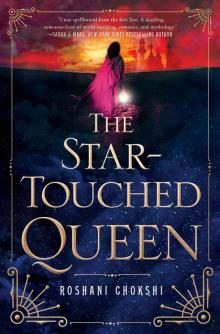 The Star-Touched Queen
The Star-Touched Queen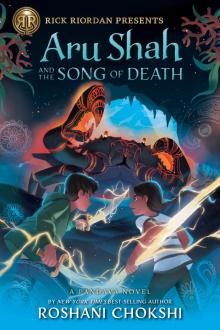 Aru Shah and the Song of Death
Aru Shah and the Song of Death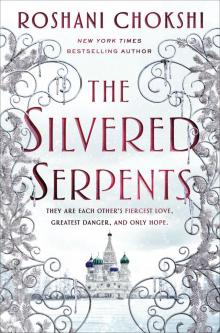 The Silvered Serpents
The Silvered Serpents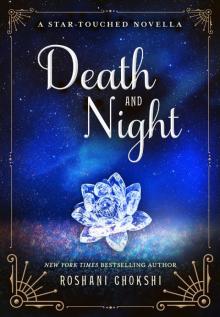 Death and Night--A Star-Touched Novella
Death and Night--A Star-Touched Novella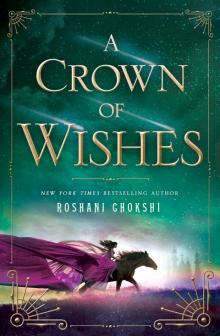 A Crown of Wishes
A Crown of Wishes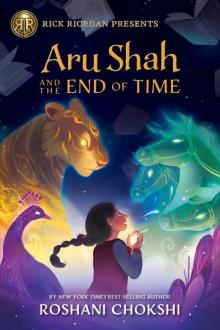 Aru Shah and the End of Time
Aru Shah and the End of Time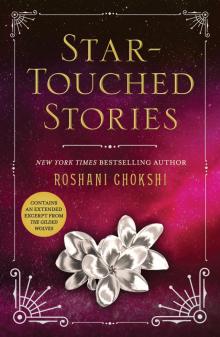 Star-Touched Stories
Star-Touched Stories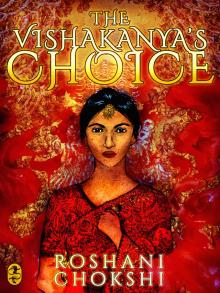 The Vishakanya's Choice
The Vishakanya's Choice